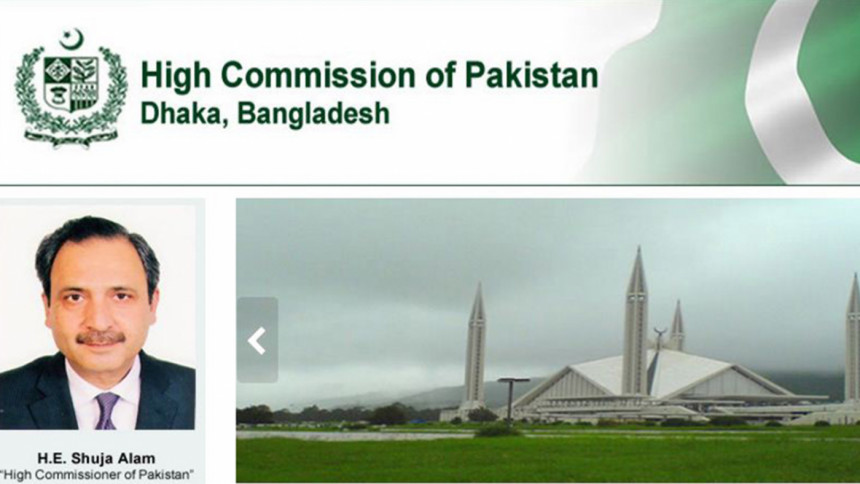Dhaka reacts sharply to Pak statement

Dhaka has reacted sharply to a statement from Islamabad on Sunday's execution of two war criminals, and summoned the Pakistan high commissioner in Bangladesh for lodging a formal protest.
Pakistani Envoy Shuja Alam was asked yesterday afternoon to come to the acting foreign secretary's office at 2:30pm today, a diplomatic source in Dhaka told The Daily Star.
The development came hours after Pakistan foreign ministry issued a statement, voicing "deep concern and anguish" over the execution of war criminals Salauddin Quader Chowdhury and Ali Ahsan Mohammad Mojaheed.
It called for reconciliation in Bangladesh in line with the Tripartite Agreement of 1974.
Salauddin and Mojaheed were hanged in the early hours of Sunday for the war crimes they committed during the 1971 Liberation War. The two sided with the Pakistan occupation forces and committed atrocities against pro-liberation people and the Hindus.
In the statement, a spokesperson of Pakistan foreign ministry said, "We have noted with deep concern and anguish the unfortunate executions… Pakistan is deeply disturbed at this development.
"As emphasised earlier, we have also been noting the reaction of the international community on the flawed trials in Bangladesh related to events of 1971.
"There is a need for reconciliation in Bangladesh in accordance with the spirit of Pakistan, India, Bangladesh Agreement of 9th April 1974. The Agreement calls for a forward looking approach in matters relating to 1971. This would foster goodwill and harmony."
In their instant reaction to the Islamabad statement, Bangladesh ministers, politicians, war crimes campaigners and freedom fighters said it was a blatant violation of diplomatic norms and interference in Bangladesh's domestic issues.
"Pakistan has no right to make any comments about internal issues of Bangladesh. Surely, we will take action by tomorrow [today] through diplomatic channels," Shahriar Alam, state minister for foreign affairs, told this newspaper in the evening.
This is not the first time that Pakistan has voiced concern over the trial of 1971 war criminals.
In December 2013, Pakistan foreign ministry issued a statement, and Pakistan National Assembly and Punjab Provincial Assembly adopted resolutions over the execution of war criminal Quader Mollah, prompting Dhaka to lodge a formal protest with the Pakistan high commissioner to Bangladesh.
Talking to The Daily Star yesterday, Awami League Presidium Member Nuh-Ul-Alam Lenin said, "Pakistan has dishonoured the people of Bangladesh by issuing this statement today. It misinterpreted the Simla Agreement.
"We are trying the war criminals in accordance with our constitution, and it is our internal matter. Pakistan has no right to interfere in our domestic issues," he said.
Civil Aviation and Tourism Minister Rashed Khan Menon said Pakistan showed extreme audacity by making the statement.
"Pakistan showed audacity just like Salauddin Quader Chowdhury did in his entire life," said Menon, also president of the Workers Party.
Mofidul Hoque, a trustee of the Liberation War Museum, said Pakistan cannot interfere in the trial by the International Crimes Tribunal.
"It [the issuance of the statement] is like interfering in our sovereignty. It is a gross violation of the genocide convention and diplomatic norms."
Pakistan should be careful about issuing any statement, as it had committed acts of genocide in Bangladesh in 1971, he added.
Abdul Ahad Choudhury, former chairman of Bangladesh Muktijoddha Sangsad, said Pakistan's statement was totally unfortunate and unexpected.
"Where was their concern when their soldiers massacred our people in 1971?" he asked.
Tureen Afroz, a prosecutor of the International Crimes Tribunal, said, "I am not shocked by their [Pakistan] reaction. They [Salauddin and Mojaheed] were their men. It was expected that they would be disturbed by the execution of the two."
"Reconciliation is possible among the people of the same country. We are no longer in East Pakistan, we are in an independent state.
"It [the statement] is a clear violation of the Vienna Convention on diplomatic relations," she said.
Shahriar Kabir, a veteran war crimes campaigner, also found Islamabad's statement "very usual".
"Why won't they feel disturbed when their man was hanged? They [Pakistan] suffered a military defeat in 1971 and now they face a political defeat as their man [Salauddin] was hanged."
Shahriar said the tripartite agreement between Bangladesh, India and Pakistan is invalid now.
As per the Vienna Convention, to which Bangladesh is a signatory, there are some crimes that no government can forgive, and genocide is one of those, he explained.
Under the agreement signed on April 9, 1974, Bangladesh agreed not to proceed with the trial of 195 prisoners of war repatriated to Pakistan.
In its 2013 judgment in the case against Abdul Quader Mollah, the International Crimes Tribunal-2 said: "Amnesty shown to 195 listed war criminals are opposed to peremptory norms of international law. It is to be noted that any agreement and treaty amongst states in derogation of this principle stands void as per the provisions of international treaty law convention [Article 53 of the Vienna Convention on the Law of the Treaties, 1969]."
"Despite the immunity given to 195 listed war criminals belonging to Pakistani armed force on the strength of 'tripartite agreement', the Act of 1973 [International Crimes (Tribunals) Act-1973] still provides jurisdiction to bring them to the process of justice," it said.
Meanwhile, Geo TV reported that Pakistan's Interior Minister Chaudhry Nisar Ali Khan said a "group" in Bangladesh is averse to restoration of amicable atmosphere between the people of Pakistan and Bangladesh.
In a statement, the Pakistani minister said it is high time the thirst ended now for taking revenge against anyone, "who is supportive of Pakistan".
"The people of Pakistan and Bangladesh wish to cultivate amicability and brotherhood by putting behind bitterness of the past."
Nisar said he is surprised to witness the silence of the world, particularly, the institutions of human rights over what he called the "killing of justice".


 For all latest news, follow The Daily Star's Google News channel.
For all latest news, follow The Daily Star's Google News channel. 



Comments